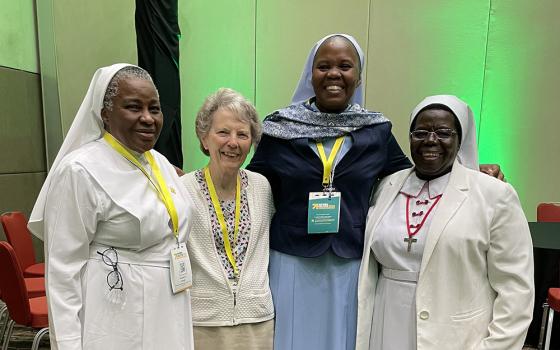Sandbags on a street in Lviv, Ukraine (Gregg Brekke)
Editor's note: Global Sisters Report's new series, Hope Amid Turmoil: Sisters in Conflict Areas, offers a look at the lives and ministries of women religious serving in dangerous places worldwide. The news stories, columns and Q&As in this series will include sisters in Ukraine, Nigeria, Kenya, Sri Lanka, Nicaragua and more throughout 2023.

Trying, exhausting and at times surreal — all are common descriptions of life in the last 12 months in Ukraine and neighboring Poland, say those displaced by the yearlong war and the religious who have assisted them.
Though moments of grace and hope are on ample display, the war's trauma has seeped into the deepest part of people's souls and psyches.
"It's true that I don't feel the war like the people displaced," said Sr. Josafata Zapotichna, a member of the Sisters Chatechists of St. Anne, whose congregation has a monastery outside of the western city of Lviv and has offered shelter for families fleeing the conflict.
"But in my consciousness, I feel it all the time," she said in a recent interview. "The images of the war go deep into my mind and I even dream about them."
Experiencing the war in visceral, physical ways is common, others say.
Sr. Josafata Zapotichna of the Sisters Chatechists of St. Anne in Bryukhovychy, Ukraine (Gregg Brekke)
"I'm safe at the moment, so I'm trying to let go of worries so they don't build up in my body," said Kateryna ("Katya") Zelinska, one of four refugee women taken in last year by Jesuit seminarians in Warsaw, Poland, and interviewed in November about their new lives.
Though not inured to the news from home, Zelinska said, she has decided it is better now not to pay constant attention to headlines and reports from her country. "I feel less panicked because I don't read the news every few minutes like before, but only once a day," Zelinska said in a recent email.
When she arrived in Warsaw last year, Zelinska said, she felt "fear for myself and my family, for my land and my future. Now I feel confident and steadfast, thanks to the support of my family and new friends who are Polish citizens."
The news from friends and family in the city of Chmielnicki, she said, is a mixture of doggedness and resilience in the face of adversity.
"Every morning, the people of Ukraine wake up to air-raid alarms," she said. "My relatives and friends who stayed there say that it is no longer scary; they are used to being without electricity, water and heating."
Some of the damage to areas around Kviv, Ukraine (Gregg Brekke)
At the same time, Zelinska and others say one of the strangest aspects of life in the last year is that, even with Russian threats and a military buildup prior to Feb. 24, 2022, they never expected the war to ever happen.
That feeling still lingers and haunts several of those interviewed. A year later, Ukrainians continue to express shock, disbelief and incredulity at what has befallen them and their country.
"Personally, I did not believe that there would be a war," Zelinska said — a sentiment shared by Svitlana Kruchynska, a refugee now living in a residence owned by Dominican sisters in Krakow, Poland.
"I can't understand why the war broke out," Kruchynska said last month at the Dominican residence in Krakow, shaking her head in disbelief. "It's beyond what I can comprehend."
She focuses instead on her new reality: working as a teacher's assistant at a Montessori school with Ukrainian students, and also teaching religious education. She sorely misses her family, friends and former life in Melitopol, Ukraine — a city known for its charm, beauty and streets lined with cherry trees.
Sr. Margaret Lekan of the Dominican Sisters in Krakow, Poland, left, and her congregational guest Svitlana Kruchynska, a Ukrainian refugee who relocated because of the war (Gregg Brekke)
"I was once a princess, like Cinderella," Kruchynska said. But now she calls herself a Cinderella in reverse. "The Russians took everything away from me."
Polish Dominican Sr. Margaret Lekan, a member of the congregation housing Kruchynska and nine others, said the experiences of refugees like Kruchynska are now part of Polish life.
More than 9 million Ukrainians have crossed into Poland since February 2022 and Poland has grown accustomed to a constant drumbeat — "the constant news of the war," said Lekan, who visited Zhovkva, Ukraine, in November on a humanitarian mission.
It is as if Poland has shared the trauma of the war with Ukraine.
In the last 365-plus days, Lekan said, "there's not been a day without news from Ukraine. It's not been a normal situation but we've learned to live with it."
While no end to the war is yet in sight, Lekan finds solace that Poland and Ukraine — two neighboring countries with often fractured relations due to the shadows of World War II — have now embraced a better space.
Sr. Margaret Lekan, of the Dominican Sisters in Krakow, Poland, and her congregation host Ukrainian refugees — women and children — who have relocated because of the war. (Gregg Brekke)
"Relations between Poland and Ukraine were not always straight, not always good." But in the last year, both countries have come to "an understanding of neighborhood" — with both fearing Russia.
In the case of Poles, she said, "We've been helping our neighbor" — doing what needs to be done.
God, Lekan said, "can take something good from this."
Even so, she said, the fear of the war's deleterious effects is real and tangible. She recalls hearing of one Ukrainian woman's concern that "hate is entering our hearts."
It is a concern that worries other Ukrainians though they must also, realistically, focus on defending themselves against a brutal, tragic and unjustified assault on their country's sovereignty.
That trauma is now being relived in the recent one-year commemorations and reflections.
Sr. Veronika Yaniv, prioress of the Sisters Chatechists of St. Anne monastery outside Lviv, wrote a reflection on her experiences from a year ago in preparation for a recent interview with Global Sisters Report.
Advertisement
"At first, in the first days," she wrote, "we were still in a state of shock — like all people, hiding in the basements during the war sirens, which lasted often and for a long time, day and night, because no one understood when and where the Russian missiles might arrive."
But, Yaniv continued, "in a few days, when the first shock passed, we realized that we would not be able to function for that long, because if we sit in the basements for long hours both day and night, then no one will be able to work or live at all."
So people began "to go to basements less often," she said, even as "war alarms lingered in the corridors of our homes."
In short, some return to normalcy has become an act of defiance — and a kind of plea for peace. For a return to normal.
"We're all praying for peace — but not only peace, our independence," Yaniv said in her interview at her congregation's monastery outside of Lviv.
As she spoke, midafternoon shadows darkened a common space at the monastery, a still-decorated Christmas tree standing nearby, a reminder of recent celebration and joy.
Sr. Veronika Yaniv of the Sisters Chatechists of St. Anne holds the son of one of the displaced mothers living at their convent. His mother was eight months pregnant when she arrived, and he has lived his entire life at the convent. (Gregg Brekke)
The celebrations included 19 people — seven children, six mothers and six retirees — staying with four sisters at the monastery. Their presence, Yaniv said, has enlivened the monastery, though has not altered the sisters' prayer life.
"We spend time together, see them, have lunch and dinner together," she said of the sisters' guests. "But we have managed to organize the time in such a way that we continue to have time set aside for the common prayer of all of the sisters."
"It's been wonderful to help people," Yaniv added.
That is the grace in a moment that has placed demands on everyone in Ukraine.
"We can't be in peace until we have freedom," she said. "Everyone wants to be free. That will be our peace."
Yearning, hope and resolve for eventual Ukrainian victory are tangible when speaking to Ukrainians — and victory is something about which Yaniv and Zapotichna feel confident.
Still, after a year of war and with the war still raging, the near future still looks troubled and uncertain.
A token of hope has to be found elsewhere.
"The only place where I can find that confidence is in Jesus," Zapotichna said. "I feel confident that he's in me, that he's my safety."








